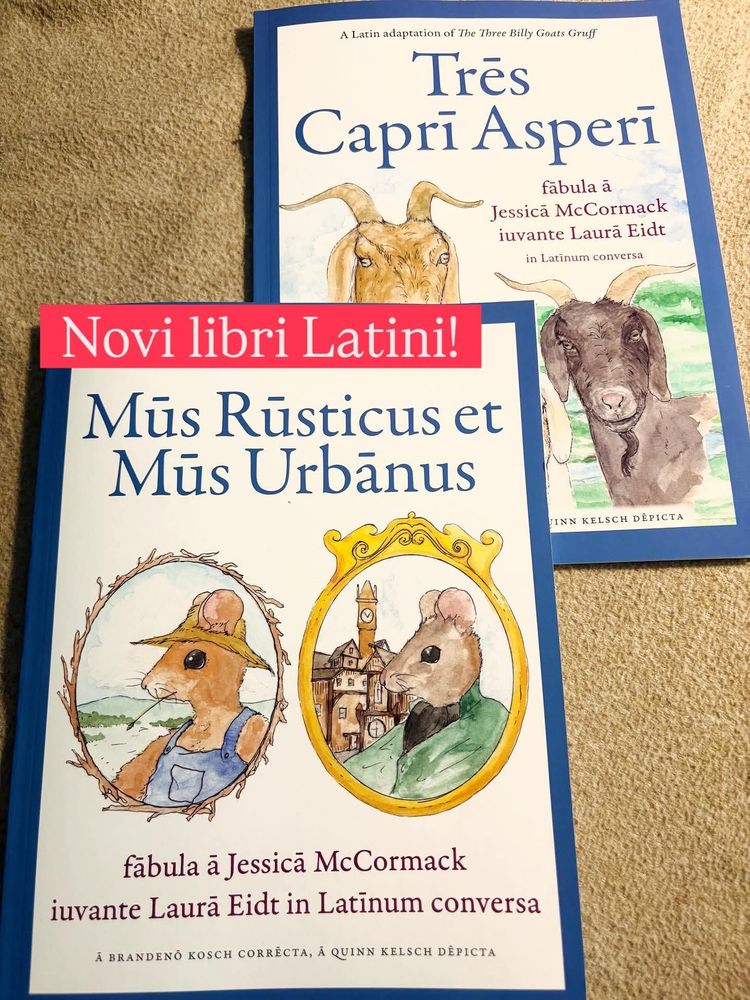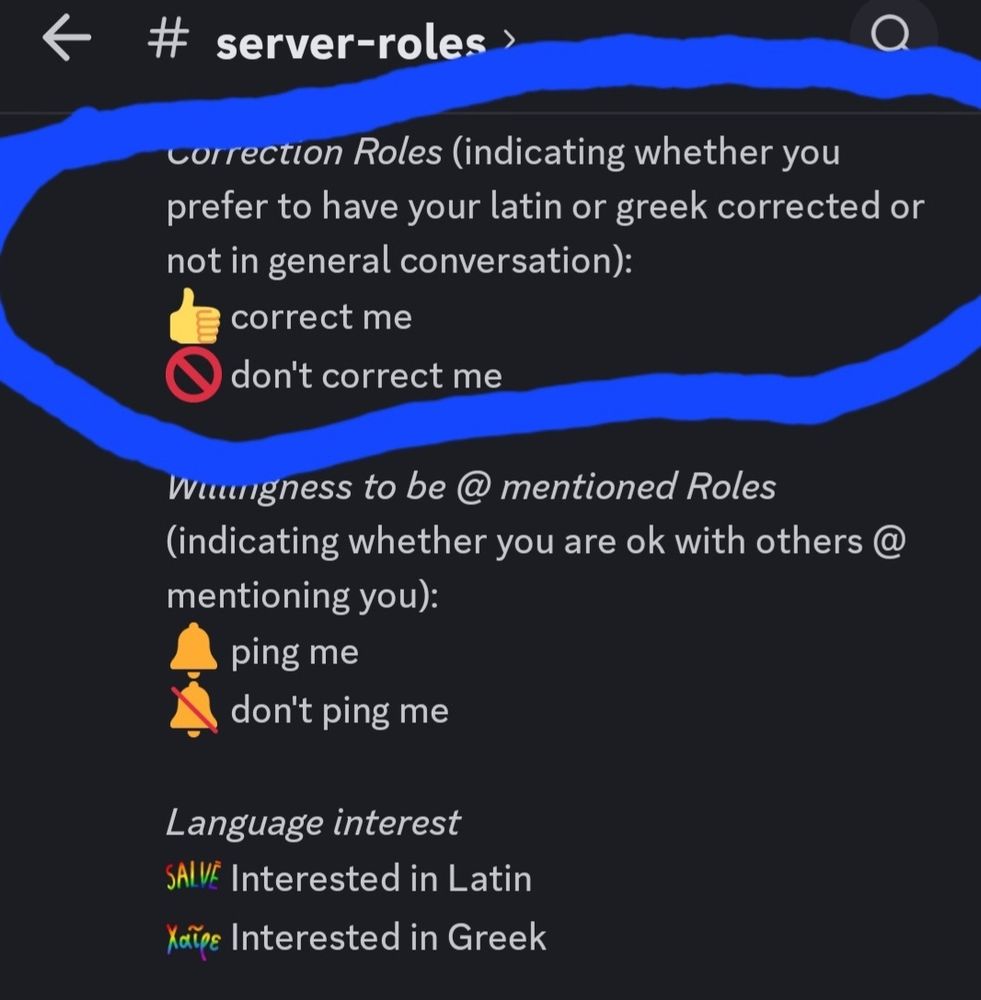(I first read about "structured input" in Common Ground by Henshaw and Hawkins, a great book for SLA informed language pedagogy)
29.08.2025 02:40 — 👍 4 🔁 0 💬 0 📌 0(I first read about "structured input" in Common Ground by Henshaw and Hawkins, a great book for SLA informed language pedagogy)
29.08.2025 02:40 — 👍 4 🔁 0 💬 0 📌 0Now that's not to say that stories always have to be written to teach a target grammar point. Just that it can be helpful to use structured input alongside stories to provide more opportunities for target features to actually be processed by learners. 10/10
29.08.2025 02:40 — 👍 2 🔁 0 💬 1 📌 0(I am hamming it up a bit, but a lot of early textbook stories featuring the accusative are as stilted as that because they're trying to not overwhelm the beginner while providing examples of the target feature.) 9/10
29.08.2025 02:40 — 👍 3 🔁 0 💬 1 📌 0
Contrast this with the salience of the accusative in paragraphs of SOV sentences:
e.g. Scintilla cēnam parat. Quīntus olīvās portat. Scintilla Horātiam vocat. Horātia casam intrat. puella cēnam cōnsūmit. puella olīvās cōnsūmit. 8/10
If I wanted to provide the answers in more complete sentences, I'd structure it so that the first word features the target grammar:
quid cōnsūmit?
a. carōtam cōnsūmit.
b. carōtās cōnsūmit. 7/10

Once I've established the students understand the difference between am/um and ās/ōs, I can then ask students to pick a word to answer to what he's eating in each picture. Obviously I'd mix up the order & add more examples. This could also be reversed - choose the right pic. 6/10
29.08.2025 02:40 — 👍 2 🔁 0 💬 1 📌 0(cōnsūmit is the word that the OLC uses for eating; it may not be the best word choice but it's what I've got to work with at this stage while keeping consistent with the textbook vocab) 5/10
29.08.2025 02:40 — 👍 2 🔁 0 💬 1 📌 0
In this example, I wanted the distinction between the accusative singular and accusative plural to be the MOST OBVIOUS feature of the text. I have a set of pictures of a pacman eating objects. "quid cōnsūmit?" is answered in a diagram: carōtam vs carōtas, pullum vs pullōs. 4/10
29.08.2025 02:40 — 👍 2 🔁 0 💬 1 📌 0"Structured input" is a way to add greater saliency to a target grammar feature. This technique is about presenting meaningful input in such a way that it is easier for learners to actually notice and process a grammatical feature. 3/10
29.08.2025 02:40 — 👍 1 🔁 0 💬 1 📌 0It's often not a very salient feature. Sandwiched in the middle of an SOV sentence, it does not stick out. Unfortunately if the SOV structure is used too repetitively and consistently, students lean on SOV word order rather than endings to attempt to understand the sentence. 2/10
29.08.2025 02:40 — 👍 2 🔁 0 💬 1 📌 0
The accusative case is tricky to teach. It is usually one of the first pieces of grammar a student encounters that is radically different from English. The students at this stage are often very young and not great at processing wordy technical explanations. 1/10
29.08.2025 02:40 — 👍 7 🔁 2 💬 1 📌 0Enjoy reading stories with your little child, and wherever possible add your own little touches. You don't have to just read the words on the page, you can use whatever level of Latin you have to describe the pictures. Have fun with the language and let that be the goal. 7/7
22.07.2025 02:35 — 👍 2 🔁 0 💬 0 📌 0I see so many well meaning parents try to pre-teach their very young kids using heavy material more suitable to older ages and an academic setting, rather than leaning into their little one's interests and capacity at that tender age. 6/7
22.07.2025 02:35 — 👍 1 🔁 0 💬 1 📌 0If you're hoping for your child to take formal Latin classes when they're old enough to study it in school, it's a good idea to slowly build enthusiasm when they are young rather than try to force them to learn too much content too soon and get burned out early. 5/7
22.07.2025 02:35 — 👍 1 🔁 0 💬 1 📌 0Now, you may not see a whole lot of language output from your child from just listening to a story, but things are happening. As long as you both enjoy the process, you are building interest and familiarity in the Latin language in a stress free, low-stakes way. 4/7
22.07.2025 02:35 — 👍 1 🔁 0 💬 1 📌 0We need to slow down and meet young children where they are, where their interests are and what suits their temperament. If you want your little child to learn Latin because you are passionate about Latin, this would be the best way to start: simple, beautiful story books. 3/7
22.07.2025 02:35 — 👍 1 🔁 0 💬 1 📌 0I'm a YouTuber, so why do I recommend picture story books? Young children need to hear their parents' loving voices. It is so much better for them than listening to a recorded voice coming from a screen. They also love to hear you reading their favourites many many times. 2/7
22.07.2025 02:35 — 👍 1 🔁 0 💬 1 📌 0
I am often asked what resources I recommend to parents of young children wanting to teach Latin to their little ones. I am glad to say these picture story books are now available from the University of Dallas website k12classical.udallas.edu/shop/?fbclid... (Photo by author Jessica McCormack) 1/7
22.07.2025 02:35 — 👍 4 🔁 0 💬 1 📌 0We may be the "experts in pedagogy" in the classroom, but the students are the only ones who can see inside and ask themselves what they really want. Let students think about their learning (& not just react), and say whether they want to hear more or less correction. 8/8
17.03.2025 23:00 — 👍 1 🔁 0 💬 0 📌 0Again, this may not reflect the make-up of the learning community in your specific high school or other situations you may be teaching in. But every community is made up of real individuals, with real preferences. Ask your students to reflect on what motivates them. 7/8
17.03.2025 23:00 — 👍 1 🔁 0 💬 1 📌 0That is to say, a Comprehensible Input informed language learning community still overwhelmingly indicated they would rather be corrected than not. (98% of those who made a preference did so to encourage corrective feedback) 6/8
17.03.2025 23:00 — 👍 0 🔁 0 💬 1 📌 0This is separate from the pedagogical choice of Active or Input-based or Grammar-Translation approaches. The Discord server in question is mainly used by learners who work through Ørberg's Lingua Latina, an input based approach, and who communicate in the target language. 5/8
17.03.2025 23:00 — 👍 0 🔁 0 💬 1 📌 0There is a generalisation thrown around that "learners don't want corrective feedback". That might be true for some groups. But there do exist groups of learners who explicitly ask for correction. Given this, we cannot simply assume all learners are demotivated by feedback. 4/8
17.03.2025 23:00 — 👍 0 🔁 0 💬 1 📌 0My takeaway from this is that decisions around corrective feedback should take on board actual student preferences. There are learning communities where learners are explicitly asking to be corrected. That may or may not be the situation with your language class. 3/8
17.03.2025 23:00 — 👍 1 🔁 0 💬 1 📌 0
Overwhelmingly more users indicate that they want to be corrected (3877) than not (77). This can be seen from the number next to the reactions (I've hidden the other reactions for privacy). That is, 98% who indicated a preference, did so to ask for corrective feedback. 2/8
17.03.2025 23:00 — 👍 0 🔁 0 💬 1 📌 0
In language teaching there is hot debate over whether correcting a student's use of the target language is helpful or discouraging. Here's one interesting piece of data: users of the Latin & Greek Discord can self-assign a tag to indicate if they want to be corrected or not. 1/8
17.03.2025 23:00 — 👍 5 🔁 0 💬 1 📌 0The video also features English subtitles so learners of all levels can turn on subtitles to understand what the Latin is saying in every part of the story - or disable subtitles as you wish! 2/2
03.03.2025 06:15 — 👍 4 🔁 0 💬 0 📌 0
Remember the part of the bible with a giant horde of skeleton zombies? I read an illustrated and tiered story of the vision of Ezekiel and the Valley of Dry Bones here! 💀 This includes a simplified Latin version plus the original text from the Vulgate! youtu.be/jQ4J31R2j1c 1/2
03.03.2025 06:15 — 👍 6 🔁 1 💬 1 📌 0
I ran the poll on Twitter/X and got a decisive lead for collective wisdom over new discovery. This is why humanities teachers matter so much. It's not just the researchers making groundbreaking work that keep humanity thinking, it's also your high school history teacher and her novelist friend.
25.12.2024 11:21 — 👍 1 🔁 0 💬 0 📌 0There will always be next Christmas! Don't run yourself too far down if it's looking dicey 👍
24.12.2024 01:05 — 👍 3 🔁 0 💬 1 📌 0